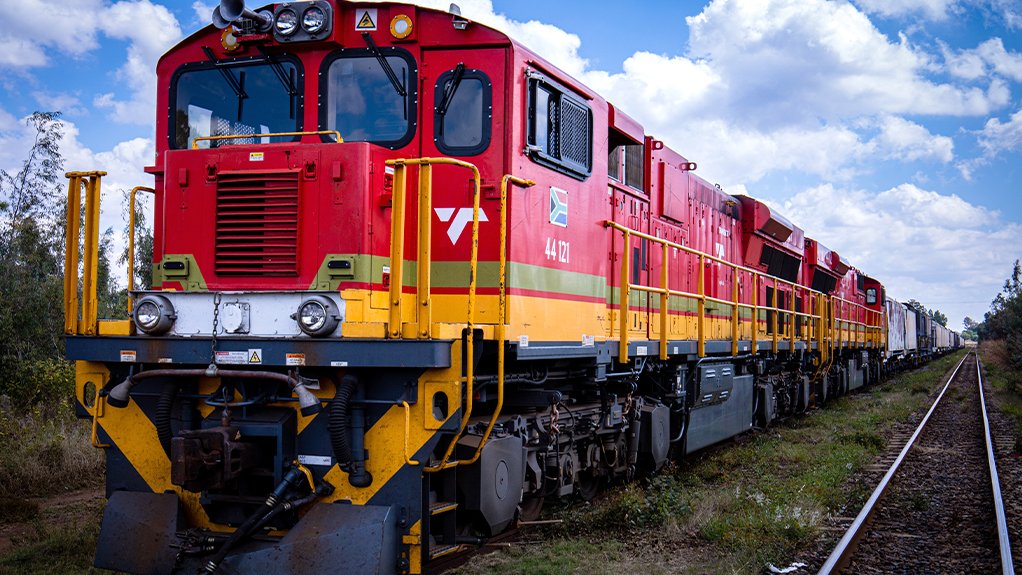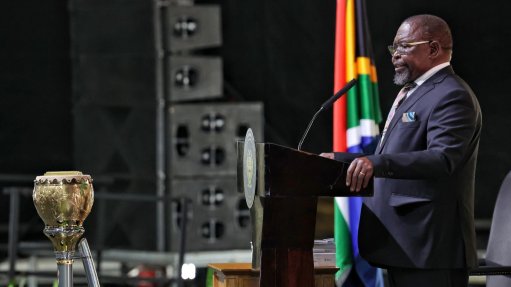Transnet is becoming a national strategic asset worth investing in – Ninety One
Global investment manager Ninety One says State-owned entity (SOE) Transnet’s turnaround signals a new era for South Africa’s logistics and infrastructure investment.
With reforms under way and fresh leadership in place, the SOE is regaining credibility and unlocking opportunities for long-term investors.
“For institutional lenders such as Ninety One, it has been encouraging to see the recent developments at the Department of Transport and across the wider sector,” the investment manager states.
After years of operational decline, Transnet is starting to show credible signs of a turnaround, which makes this a critical moment to reassess both risk and opportunity in relation to Transnet’s debt and the broader logistics investment landscape.
For example, after Transnet’s rail volumes dramatically fell by 34% from 226-million tonnes in 2018 to 150-million tonnes in 2023, there have been signs of improvement, with rail volumes having increased to 160-million tonnes this year.
This marks a 13% increase compared with 2024.
Transnet is moving in the right direction by targeting 181-million tonnes of rail volumes moved in 2026, Ninety One says.
On the ports side, Durban Pier 2, which handles nearly half of South Africa’s container traffic, was equipped with 20 new straddle carriers, reducing backlogs by 45%.
In the coal corridor, where sabotage and theft had long disrupted flows, Transnet reported a 65% reduction in security incidents between September 2023 and March 2024, following joint efforts with customers and law enforcement. While this is a positive internal operational metric, it reflects progress specific to the coal line and not the broader network.
Operational gains are being reinforced by deeper structural reform, the company explains, adding that the R51-billion in government guarantees has stabilised liquidity and funded critical capital expenditure.
Additionally, government recently approved a top-up of R94.8-billion to further aid with infrastructure maintenance.
Transnet has also received support through the National Treasury’s Budget Facility for Infrastructure to fund key projects associated with improving the broader logistics sector.
Meanwhile, leadership renewal has sent positive signals to markets.
Ninety One believes Transnet CEO Michelle Phillips, COO Solly Letsoalo and CFO Nosipho Maphumulo have offered a blend of institutional memory and operational credibility. “They have accelerated procurement, improved coordination with customers, and fostered investor confidence.”
Critically, Transnet is opening its networks to private participation.
The sale of rail slots to third-party operators, the establishing of a Private Sector Participation Office to engage with the private sector, as well as the appointment of an independent Infrastructure Manager, are early steps towards a hybrid model that retains public oversight while inviting private capital and operational capacity.
Ninety One says for bondholders and infrastructure investors the implications are significant.
“Government backing has underwritten Transnet’s recent issuances and mitigated refinancing risk. Free cash flow remains constrained, but improved volumes and capital discipline point to a medium-term deleveraging path.”
Beyond credit, Ninety One states, Transnet is fast emerging as a platform for co-investment. From rolling stock and corridor upgrades to terminal concessions, the post-crisis environment is creating new bankable infrastructure opportunities.
From Ninety One’s perspective, its contribution to these developments is reflected through initiatives such as its South Africa Infrastructure Credit Fund, which helps mobilise institutional capital into critical infrastructure, including transport and logistics.
With a focus on senior debt, the fund supports well-governed, economically strategic projects, reinforcing the growing role of private capital to aid government in addressing South Africa’s infrastructure backlog.
While challenges remain, Transnet’s recovery is gaining credibility.
For institutional investors, this is no longer just a troubled SOE; it is a strategic national asset at the centre of an unfolding economic and policy realignment.
“Backed by reform, capital, and political resolve, Transnet’s transformation signals a turning point for South Africa’s logistics, and for those with the capital and conviction to stay the course,” Ninety One notes.
DEMISE CONTEXT
Before the recent wave of reforms, Transnet was entrenched in a multi-dimensional crisis. Years of State capture had hollowed out governance and procurement integrity, eroded institutional capacity and left critical operational divisions vulnerable to mismanagement and corruption, Ninety One explains.
The company adds that this legacy severely undermined Transnet’s ability to maintain and expand infrastructure or deliver reliable service to its customers. Its freight rail volumes were in freefall, driven by a sharp decline in operational locomotives, many idled owing to a lack of critical spares and disputes with suppliers.
Cable theft surged, with more than 1 000 km having been stolen in the 2023 financial year alone, which inflicted nearly R4-billion in losses. These operational failures compounded chronic underinvestment in infrastructure, leading to mounting maintenance backlogs and a spike in derailments.
At the ports, inefficiencies and equipment shortages turned Durban and Cape Town into export chokepoints.
Financially, Transnet was equally distressed, with poor free cash flow, high gearing, and multiple breaches of bank covenants shaking investor confidence. Executive turnover and governance lapses deepened market uncertainty. Without decisive action, Transnet’s collapse was beginning to look inevitable, Ninety One notes.
The turning point came in 2023. With logistics failures slowing economic growth, pressure intensified from business leaders, trade unions, and the government. In response, President Cyril Ramaphosa launched the National Logistics Crisis Committee, which brought together public and private sector leaders.
In parallel, Transnet unveiled a formal Recovery Plan in September 2023, backed by new executive leadership and a R51-billion government guarantee facility. This marked a clear pivot from crisis management to structural reform.
Article Enquiry
Email Article
Save Article
Feedback
To advertise email advertising@creamermedia.co.za or click here
Press Office
Announcements
What's On
Subscribe to improve your user experience...
Option 1 (equivalent of R125 a month):
Receive a weekly copy of Creamer Media's Engineering News & Mining Weekly magazine
(print copy for those in South Africa and e-magazine for those outside of South Africa)
Receive daily email newsletters
Access to full search results
Access archive of magazine back copies
Access to Projects in Progress
Access to ONE Research Report of your choice in PDF format
Option 2 (equivalent of R375 a month):
All benefits from Option 1
PLUS
Access to Creamer Media's Research Channel Africa for ALL Research Reports, in PDF format, on various industrial and mining sectors
including Electricity; Water; Energy Transition; Hydrogen; Roads, Rail and Ports; Coal; Gold; Platinum; Battery Metals; etc.
Already a subscriber?
Forgotten your password?
Receive weekly copy of Creamer Media's Engineering News & Mining Weekly magazine (print copy for those in South Africa and e-magazine for those outside of South Africa)
➕
Recieve daily email newsletters
➕
Access to full search results
➕
Access archive of magazine back copies
➕
Access to Projects in Progress
➕
Access to ONE Research Report of your choice in PDF format
RESEARCH CHANNEL AFRICA
R4500 (equivalent of R375 a month)
SUBSCRIBEAll benefits from Option 1
➕
Access to Creamer Media's Research Channel Africa for ALL Research Reports on various industrial and mining sectors, in PDF format, including on:
Electricity
➕
Water
➕
Energy Transition
➕
Hydrogen
➕
Roads, Rail and Ports
➕
Coal
➕
Gold
➕
Platinum
➕
Battery Metals
➕
etc.
Receive all benefits from Option 1 or Option 2 delivered to numerous people at your company
➕
Multiple User names and Passwords for simultaneous log-ins
➕
Intranet integration access to all in your organisation




















